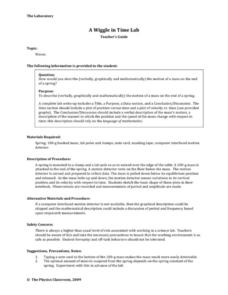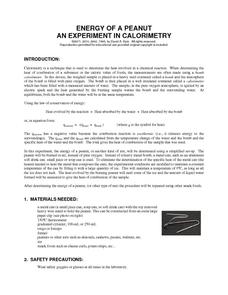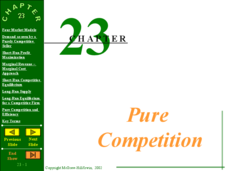Curated OER
Indoor Air Pollutant Sensing LAB: Peppermint Diffusion
Students engage in an experiment for the scientific concept of diffusion of particles. There are instructions for classroom set up prior to conduction of the activity. Students sit in the classroom that is filled with the smell of...
Curated OER
Acids and Bases
Students comprehend the basics of acid and base chemistry, with an emphasis on computation and equilibrium. They are introduced to the following concepts: Arrhenius, Bronsted-Lowry, Lewis definitions, Hydrogen Ion equilibrium, and...
Curated OER
Survival Of The Fittest
Seventh graders examine the concept of an ecosystem and how there is a variety of representations of life that exist there. They look at the equilibrium that is reached in stable communities and how the variable of change in...
Curated OER
Virial Theorem Lesson
Ninth graders describe how equilibrium can occur as the balance of two effects. They model the stability of elliptical galaxies based on how fast stars within the galaxy are moving.
Curated OER
Ice Ain't Easy
Students are told that objects in contact with one another reach an equilibrium temperature. A hot object placed in a cool liquid always cool off. It never happens that the object gets hotter and cool liquid gets colder. Students predict...
Curated OER
Your Body: A Bacteria Incubator!
Students demonstrate their comprehension of PREDICTING AND HYPOTHESIZING by... ¿¿¿ Predicting a logical outcome to a situation, using prior knowledge, experience and/or evidence. AND ¿¿¿ Explaining reasons for that prediction. They...
Curated OER
The History of Life
In this extinction worksheet, students review how species evolve and how species go extinct. Students compare and contrast gradualism and punctuated equilibrium. This worksheet has 6 fill in the blank and 4 short answer questions.
Curated OER
Haber's Process- A Computer Simulation
Students use an on line simulation to produce ammonia using Haber's process. In this Haber's process lesson plan, students use a spreadsheet to manipulate the pressure, temperature and catalysts used in the production of ammonia. Their...
Physics Classroom
A Wiggle in Time Lab
Though an alternative method is suggested, the best way to carry out this investigation is with the use of a computer-interfaced motion detector. Physics fanatics hang a mass on the end of a spring and analyze its motion verbally,...
Consortium for Ocean Science Exploration and Engagement (COSEE)
Carbon Dioxide & Krill: Impacts
What effects do temperature and carbon dioxide levels have on the zooplankton of Antarctica? This concluding lesson plan in a short unit on climate change and the ocean helps environmental scientists answer these questions. After...
Chymist
Energy of a Peanut
Are you nuts? An engaging experiment burns nuts to find their kilocalories. Young chemists analyze at least two different types of nuts with their experimental results versus what is on the package. The resource offers a great lab for...
Virginia Department of Education
Mystery Iron Ions
Young chemists perform an experiment to determine if a compound is iron (II) chloride or iron (III) chloride. Then they determine the formula, balance the equation, and answer analysis questions.
Virginia Department of Education
The Rate of a Chemical Reaction
If your pupils think a catalyst is a list of their cats, then this might be the lesson plan for you! Young chemists study the effect of temperature, catalysts, concentration, and particle size on reaction rates during four different...
Chicago Botanic Garden
Micro-GEEBITT Climate Activity
A truly hands-on and inquiry based learning activity bridges all the lessons in the series together. Beginning with a discussion on average global temperatures, young meteorologists use real-world data to analyze climate trends in order...
Curated OER
Chapter 23: Pure Competition
Taking your young economists through the characteristics of four market models (Pure Competition, Pure Monopoly, Oligopoly, and Monopolistic Competition), this presentation uses both charts and graphs to illustrate the necessary...
Curated OER
Chapter 10: Aggregate Expenditures (The Multiplier, Net Exports, and Government)
Effectively portraying the multiplier effect and the gaps within recession and inflation periods, these slides would be a good resource for both a beginning and advanced economics class. Clear, easy-to-read graphs and charts take viewers...
Curated OER
Chapter 11: Aggregate Demand and Aggregate Supply
Bring the intricacies of the Aggregate Demand-Aggregate Supply Model (AD-AS) to life in this detailed - yet understandable - presentation. Viewers will appreciate the clear explanations and graphs as they begin their adventure through...
Curated OER
Chapter 37: International Trade
Several graphs help to illustrate the dynamics of international trade in this slideshow. World prices, imports and exports, and the economic impact of tariffs are detailed in the presentation, along with arguments for free trade and the...
Curated OER
Ride the Rock Cycle
Young scholars identify the steps in the rock cycle. They complete a K-W-L chart before the lesson begins. They answer questions about the stages to complete the lesson.
Curated OER
Determination of the solubility product of silver(I) chloride
In this chemistry worksheet, students examine the concept of solubility of silver chloride. The sheet has in depth concept and laboratory instructions.
Curated OER
Acid-Base Chemistry
In this acid-base worksheet, students write balanced chemical equations given the reactants for 18 reactions. If no reaction occurs, they write N.R. They also rank acids and bases in increasing order.
Chymist
The Solubility of a Salt in Water at Various Temperatures
An educational lesson allows young chemists to test the solubility of different types of salt at various temperatures. Groups create a graph using data from unsaturated, saturated, and supersaturated solutions.
DiscoverE
Pilot a Balloon
Balloons will go where you want them to. Young pilots first add paper clips to a balloon to make it neutrally buoyant. They then use cardboard to steer the balloon in different directions, taking air pressure into account.
DiscoverE
Friction in Action
There's no need to have friction among instructors regarding the resource. Pupils investigate how marbles and coins slide along different surfaces which gives them information to estimate coefficients of friction.
Other popular searches
- Dynamic Equilibrium
- Chemical Equilibrium
- Hardy Weinberg Equilibrium
- Thermal Equilibrium
- Market Equilibrium
- Punctuated Equilibrium
- Equilibrium Prices
- Genetic Equilibrium
- Equilibrium Constants
- Prue Calculus Equilibrium
- Equilibrium Quantities
- Price Equilibrium

























